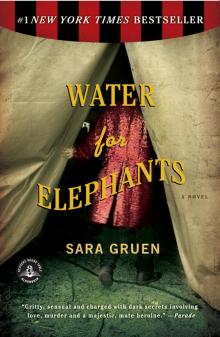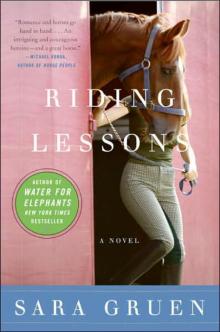- Home
- Sara Gruen
At the Water's Edge Page 4
At the Water's Edge Read online
Page 4
The Colonel's face was tinged with blue, like the skin of a ripe plum, and for a moment I thought he might be having a stroke. He lifted a quivering finger and pointed at the door.
"Get out," he said in a strange, hollow voice. "Pemberton will send your things."
Ellis shook his head in confusion. "What do you mean? To where?"
The Colonel turned his back to us, resting one elbow on the mantel, posing.
"To where?" Ellis asked with increasing desperation. "Where are we supposed to go?"
The Colonel's stiff back and complete lack of response made it clear that wherever we went, it was of no concern to him.
Chapter Four
Ellis directed the chauffeur to the Society Hill Hotel on Chestnut Street. On the surface it looked fine: the facade and public areas were up to par, but our suite was faded and shabby and had only one bedroom. However, it was what we could afford on Ellis's reduced allowance.
Ellis bought a bottle of whiskey from the lobby bar while the clerk was checking us in and began downing it as soon as we got upstairs.
I understood his desperation. If the Colonel cut his allowance completely, we'd be destitute. Regrettably, it was a very real possibility.
Ellis's crime against his father was twofold, and the parts were equally grievous. He had been caught railing against the Colonel behind his back, and then had accused him of fraud to his face. I didn't think the Colonel was capable of forgiving either separately, but together they were exponentially worse.
As we waited for our things to arrive, Ellis paced and drank, analyzing and reanalyzing what had just happened and generally working himself into a lather. At one point, when he allowed as to how he wouldn't have lost his temper if he hadn't been driven to defend me, I thought he was unfairly trying to shift the blame to me and said so, pointing out that I hadn't uttered a word throughout the entire fiasco.
He stopped and looked at me, both pained and surprised.
"My God," he said. "That's not what I meant at all. Of course it's not your fault. You did absolutely nothing. Her attack on you was completely gratuitous."
"It's all right," I said. "She didn't say anything everyone else wasn't already thinking."
"It's not all right, and I will never forgive her. Neither should you."
I hoped he would change his mind, because his mother was currently our only hope of returning to grace. Although she demonstrated her affection in strange ways, her whole world revolved around Ellis and, to a lesser degree, in torturing me. Without us, her life would be a void. I was entirely sure that she was already attempting to intercede, but I'd never seen the Colonel in such a state and I wasn't sanguine about her chances.
Appealing to my own father was pointless. When I wrote to tell him that Ellis and I had eloped, I'd expected him to be upset and wasn't surprised when he didn't respond right away. It was months before it dawned on me that he wasn't going to. I'd seen him only once since, although we lived less than two miles apart. He was crossing the street, and when he saw me, he pretended he hadn't and turned the other way. From overheard fragments of conversation, I gathered his activities revolved almost exclusively around the Corinthian Yacht Club, allowing him to avoid contact with the fairer sex altogether.
At some point after midnight, I managed to convince Ellis that our things weren't on their way and we should just go to bed. Neither of us had so much as an overnight bag.
While the room was stuffy, it was also drafty. Ellis called me a "blanket hog," accusing me of repeatedly rolling away with the covers, at which point he'd grab them back and leave me exposed. After a few rounds of tug-of-war, which started out in good fun but deteriorated quickly, we ended up facing opposite directions on the edges of the bed with neither one of us adequately covered.
I lay awake worrying. When Ellis finally fell asleep, he snored so loudly I had to hold a pillow over my head, pressing it against my ears. There was an odd smell, sort of earthy and minerally. For the rest of the night, all I could think about was how many heads had lain on those pillows before my own.
--
We were roused by an understated yet insistent rapping at the door.
"Dear God," croaked Ellis. "What time is it?"
I peered at the radium-painted clock beside me. "Nearly seven."
"The sun's not even up," he complained.
After a few more minutes of intermittent knocking, I mumbled, "You'd better get it. They're not going away."
He sighed irritably, then shouted, "Coming!"
He switched on the lamp and rolled out of bed, yanking the chenille bedspread off as though he were doing the tablecloth trick. He wrapped it around his shoulders and stomped away, slamming the bedroom door behind him.
I had a fair indication of what was going on because of the shuffles, bangs, and clunks. It went on for nearly ten minutes.
When Ellis returned, he wadded up the bedspread and tossed it onto my legs. As he flopped back into bed, I tried to straighten it.
"Our things, I presume?" I asked.
"Our every worldly belonging, from the looks of it. Six carts' worth. We're going to have to turn sideways to get to the door."
I tried not to panic--the Colonel would have given the order before he retired for the night, when his anger was still fresh--but a queasy feeling settled in the pit of my stomach anyway.
"I don't suppose you have any idea where your pills might have ended up?" Ellis asked.
"Would you like me to have a look?"
"Never mind," he said miserably. "It's all right."
The lamp was still on, so I went to the front room.
The floor was almost entirely covered by trunks and suitcases. Emily, Pemberton, and the others must have been up all night packing.
I found my cosmetics case on a low table, along with my hatboxes. To my relief, it was organized immaculately, the pill bottle tucked discreetly under its tray. Poor Emily--we'd cost her at least two nights' sleep, which my mother-in-law would certainly not consider an excuse if her daytime duties suffered.
I handed the bottle to Ellis and sat beside him. He propped himself up on an elbow, shook two pills into his hand, and swallowed them dry. Then he fell back onto his pillow.
"Thank you, darling. I'm a little on edge," he said.
"I know. Me too."
"Let's try to get back to sleep. In the morning--in the real morning--I'm going to have the largest goddamned lobster in the city brought up to us, along with a mountain of potato salad. Caviar, too. They can skip the plates and just bring forks."
I made my way back to my side of the bed. When I crawled under the covers, Ellis switched off the lamp. We found ourselves much closer together than we had been before. He rolled onto his side and threw an arm across my waist.
"Well, what do you know," he said. "Maybe there are enough blankets after all."
--
In the early evening, the concierge called to tell us that Hank was waiting for us in the lobby bar.
Ellis and I were no longer speaking, a result of my suggestion that he talk to his mother and try to pave the way for a truce. We rode the elevator in silence.
The boys drank bourbon sidecars, and I ordered a gin fizz. A few drinks in, as Ellis and I took turns recounting the disastrous repercussions of the party, the freeze began to thaw. Soon, we were finishing each other's sentences and apologizing with our eyes. We were in the same mess, facing the same consequences. Although I was willing to capitulate sooner, it was just a tactical difference. We were upset with our situation, not each other.
I reached my foot out under the table and ran it lightly down his calf. His eyes brightened, and the edges of his mouth lifted into a smile.
"I'm still trying to wrap my head around the idea of your mother shouting," said Hank. "Are you sure it was your mother? The same Edith Stone Hyde I've known all these years?"
"The very one. And it was more like a hooting," said Ellis. "An overtaxed owl."
"A broken-down woodwin
d," I added. "Frail, yet screechy."
"I'd have paid good money to see that," said Hank, lighting a cigarette.
"I wish I'd known," said Ellis. "I'd have offered you my seat."
"Do you really think the Colonel and your mother had an affair?" Hank asked, blowing a series of smoke rings.
"Of course not," I said. "My gorgon of a mother-in-law extrapolated that because at some point she caught him looking at her, which I'm sure he did. Everybody did."
"Yes, but he also defended her," Hank pointed out. "To his wife."
"So maybe he carried a little torch for her," I said, "which still means nothing, because who didn't? She had that effect on people."
"Not your father," Hank continued. "I never did understand why she married him. She could have had anybody she liked. Gorgeous, pedigreed, a bank account the size of Montana...I can't imagine why she allowed herself to get hitched to an old fart like your father."
"She wasn't pedigreed," I said, throwing him a dirty look. Hank knew perfectly well that my mother had married up.
Hank looked outraged. "Of course she was pedigreed...in the Levee District!" He broke down, cackling at his own joke.
"Ha ha," I said flatly.
"No offense, darling girl. Money is its own pedigree. But back on topic, what if it's true? Maybe that's why your mother-in-law was so hell-bent against the two of you getting married. Maybe," he said, waving his cigarette in circles, "you're brother and sister."
Ellis and I burst into simultaneous groans of disgust.
"Hank, that's not even remotely funny! Please. My mother did not have an affair with the Colonel."
"How can you be so sure?" Hank went on. "Maybe that's the reason your mother-in-law encouraged him to go monster hunting. To get him out of harm's way, so to speak."
"I'm sure she just wanted him out of the way, period," I said. "She probably packed his bags. She probably booked his passage."
"You're both forgetting that it was his idea," said Ellis. "He couldn't get out of there fast enough. I'm surprised he didn't leave a Colonel-shaped hole in the front door on the way out. Can hardly blame him, though."
"She is a trial," I said.
"She's worse than that," said Ellis, looking suddenly grim.
Hank leaned back in his chair and cocked an eyebrow. He looked first at Ellis, and then at me. "Your drinks are empty. Let me remedy that." He snapped his fingers over his head until he got the attention of the bartender, then pointed at the glasses.
Ellis stared into his depleted drink, poking the ice cubes with his swizzle stick.
"So," Hank said, rubbing his hands together. "Given the circumstances, I think you'll be even more pleased to hear my news."
"Unless you're about to tell me my father dropped dead, I highly doubt it," Ellis said without looking up.
The waiter delivered fresh drinks. Ellis pulled his toward him, picked up the new swizzle stick, and went back to stabbing ice.
"Maddie, darling?" Hank said expectantly.
I sighed before dutifully asking, "What news?"
"I've found us passage."
"Passage to where?" I asked in the same disinterested voice.
I knew full well what he was talking about, and was trying to convey that I didn't want to play, and was quite sure that Ellis didn't either.
"You know," Hank said with a coy smile.
I went for the direct approach. "Hank, we're not in the mood right now. That's what got us into this pickle in the first place."
"Then get in the mood. We leave in three days."
I put my drink down and took stock of his demeanor. He was deadpan, yet clearly pleased with himself.
"You're not serious," I said.
"I'm in absolute earnest," he replied.
"But it's impossible. There are no liners running."
"Connections, Maddie, connections," he said with a flourish. "We're going on a Liberty ship. The SS Mallory, a freighter taking supplies. It's part of a convoy. And speaking of supplies, stock up on cigarettes and stockings, both nylon and silk. International currency, if you will."
His continued straight face began to worry me.
"Hank, this isn't funny."
"It's not meant to be."
"We can't cross the Atlantic during the war--"
"We'll be perfectly safe. We're going to the Highlands. That's where they sent the evacuated children from the cities, for God's sake."
I turned to Ellis. He'd abandoned the ice, and was now pushing the ashtray back and forth.
"Darling, say something," I pleaded.
"Don't we need papers, or something?" he asked.
"Arranged for them too," Hank said brightly. "And a sixteen-millimeter Cine-Kodak movie camera. After we get our footage of the monster, we'll send the reel directly to Eastman Kodak and have them develop it. Voila--would-be naysayers won't have a nay to say. We'll make history. We'll be famous."
After a moment of silent stammering, I managed to ask, "And what does Violet think about this?"
Violet was nothing if not sensible. She didn't even approve when we pulled entirely harmless pranks, like hiding someone's yacht in the wrong slip, or turning the racquet club's pool water purple. She'd sent an apology after we had General Pew's sailboat moved around to the back of his house, even though she wasn't there when the crime was committed.
"No idea. She's off doing something or other," said Hank. "Rolling bandages or the like."
"You haven't told her," I said in disbelief.
"Not yet," said Hank, sipping his drink. "I figured one day of misery was preferable to three."
"She'll never agree to it."
"I don't expect her to."
"Hank, she's expecting you to propose. You can't just abandon her."
"I will propose, just as soon as we get back. Frankly, I'm getting a little worried that she's rubbing off on you. I was hoping it would work the other way around."
"Hank's right," said Ellis, still pushing the ashtray around. "You used to like adventures."
"I do like adventures, but sailing into the war is hardly an adventure!"
"Then think of it as a scientific excursion," Hank said calmly. "Honestly, Maddie. We'll be perfectly safe. You can't imagine I would even suggest it if I weren't completely sure of that, and Freddie certainly wouldn't have arranged it."
"Freddie?" I said with growing despair. "What's Freddie got to do with this?"
"He's the one who made the arrangements, of course."
While I was trying to wrap my head around Freddie's involvement in all this, Hank looked deep into my eyes.
"Maddie, darling girl. This is my last hurrah, my final bit of craziness before donning the ball and chain. And since my particular ball and chain seems intent on civilizing me, surely you wouldn't deny me this one final caper?"
"Why don't we come up with something that won't get us blown to pieces? And who's to say that I won't rub off on Violet after all? When the war ends, we'll force her to come with us. I'll buy a pair of hip waders and bag the monster myself--heck, I'll buy a pair for Violet and drag her kicking and screaming into the loch with me. Won't that be a sight?"
Hank leaned forward and pressed two fingers against my lips.
"Shhh," he said. "We have to do this. It's for Ellis."
Ellis looked suddenly up. The fire was back in his eyes. "Let's do it. Let's fucking do it. It fixes everything."
"What? What does it fix?" I asked.
"Everything," he repeated.
I could see there was no arguing with him--at least not there, and certainly not in front of Hank.
"I'll have one of those cigarettes," I said, bobbing my foot under the table and glaring at the rows of glittering bottles behind the bar.
In a flash, Hank had the case open and extended. I let him hold it there for a few seconds longer than was comfortable, then grabbed one.
Hank leaned forward, completely cool, and flicked his lighter, a sterling silver Dunhill with a clock on its side
. I sucked a few times, enough to get the thing lit, then pushed my chair back and marched toward the bank of elevators, letting my heels clack noisily on the marble. I ditched the cigarette in the first available ashtray because I hated cigarettes, which both Hank and Ellis knew. Asking for one was a statement. Ellis was supposed to follow me back to our suite. Instead, he stayed in the lobby bar with Hank.
--
I paced the room, trying to persuade myself that this was a joke, that Hank was just pulling our legs, but every instinct told me otherwise. He'd worked out too many details, and if it was a prank, he wouldn't have let it go on after he saw Ellis's reaction--unless they were in on it together, but that seemed even less plausible. They hadn't had a moment alone to plan.
I just wanted everything to go back to normal, but the only way that could happen would be if we found a solution that let both the Colonel and Ellis emerge with their dignities intact. Collective amnesia would have been an option if the accusations had been limited to the drawing room, where the only witness was the canary, but they hadn't. The Colonel had been disgraced in public.
The part that frightened me most, that made me think Hank really had made solid plans, was his mention of Freddie. If anyone could manage such arrangements, it was Freddie Stillman, whose father was an admiral, but it was beyond me why he'd lift a finger to help. The four of us had been close friends, a quartet instead of a trio, during one blissful summer in Bar Harbor, Maine, until I rejected his completely unexpected proposal, and probably not as sensitively as I should have. Ten days later, I eloped with Ellis, and we hadn't exchanged a word since. That was four and a half years ago.
I was surprised that Hank was still in touch with him, especially since it was rumored that Freddie had set his sights on Violet before Hank rolled through and swept her off her feet.
--
Ellis returned hours later, entirely smashed, and confirmed my fears. This was no prank, and he was absolutely determined that we were going to go.
I pointed out, as gently as I could, what I'd hoped was obvious: that it made no sense whatsoever to throw ourselves into the middle of an ocean crawling with U-boats on a quest to find a monster that probably didn't even exist, especially as a way of proving his worth to people who were too ignorant to realize he was as honorable as any of them. We knew the truth. I knew the truth. It would be difficult, but together we could withstand the scrutiny until the war ended.

 Ape House
Ape House Water for Elephants
Water for Elephants Riding Lessons
Riding Lessons At the Water's Edge
At the Water's Edge